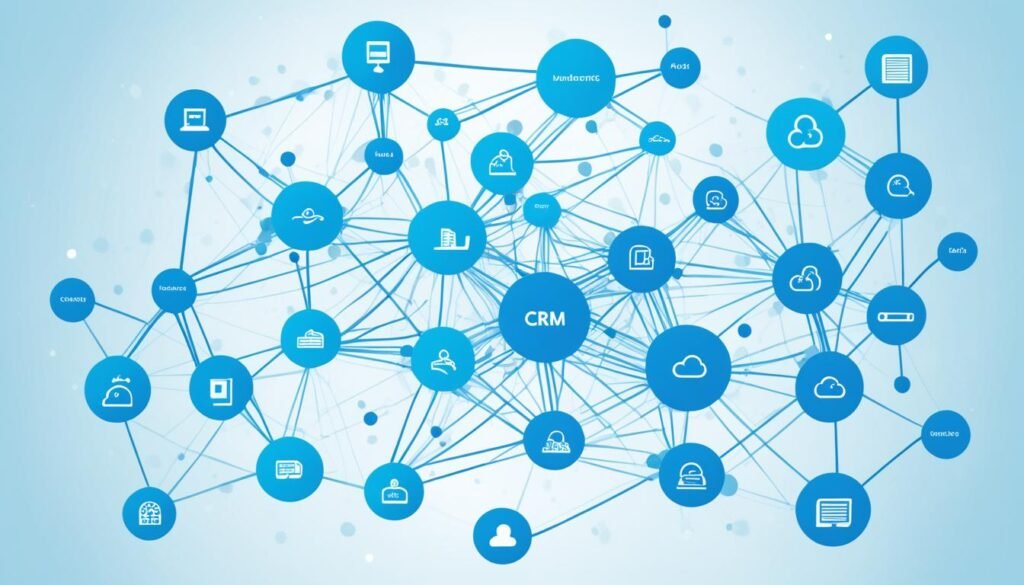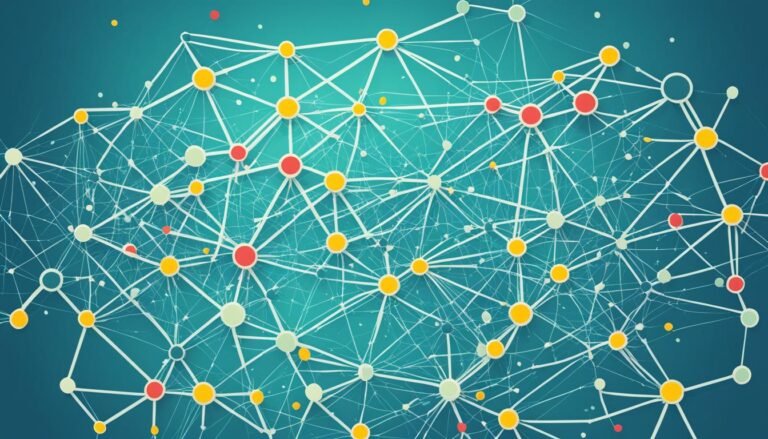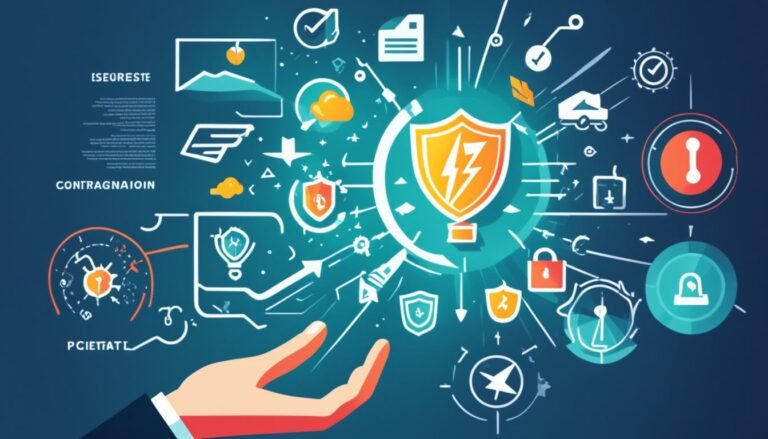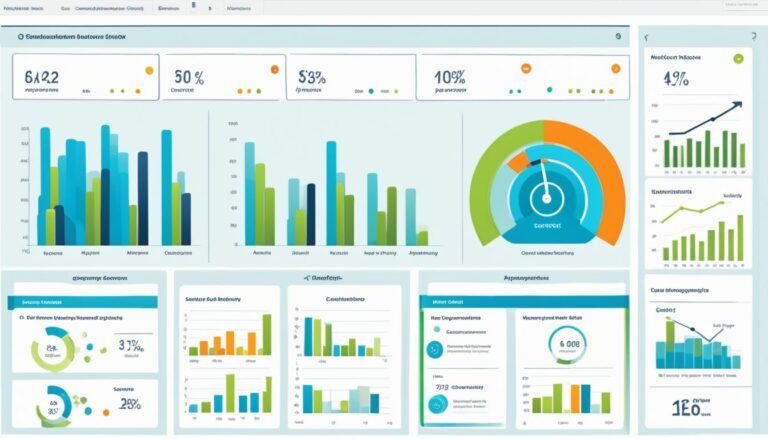What is the purpose of customer relationship management systems?
Companies grow with good customer relationship management (CRM) systems, seeing their customer return rates go up by 27%. This boost in customer loyalty brings in more business. It shows how vital CRM software is today.
CRM helps businesses handle all customer interactions. It simplifies processes and makes companies more profitable. With one place for customer data, businesses can cut expenses. They also boost teamwork, up productivity with AI, and gain other advantages.
Key Takeaways:
- Effective CRM systems can increase customer retention rates by up to 27%
- CRM software provides a single source of truth for customer information
- CRM systems help companies save costs, increase productivity, and improve customer support
- AI integration in CRM software enhances efficiency and accuracy
- CRM software offers a wide range of benefits and features for businesses of all sizes
Who is CRM for?
CRM software is great for any company, regardless of its size. It helps big enterprises manage their lots of customer interactions. Likewise, it aids small businesses and startups by making them more efficient. Non-profits also benefit from its ability to streamline operations. CRM is versatile and helps all types of organizations grow.
Large enterprises with many moving parts find CRM software especially useful. It makes tracking customer activities easier. This leads to more effective sharing of information. Thus, departments work better together, improving customer service and sales methods.
Small businesses, on the other hand, struggle with scarce resources. CRM software helps them automate processes, organize data, and gain insights. This lets them be more efficient. The focus can then shift to developing strong customer relationships.
Startups need to grow fast and efficiently. CRM tools are a great match for their evolving needs. These tools help manage customer relationships and sales. They also streamline marketing activities. As a result, startups can better compete in their markets.
Plus, CRM software is useful for all departments in a business. Sales teams stay on top of leads and customer interactions. IT departments enjoy more organized data management. Marketing teams can plan and run targeted campaigns. The flexibility of CRM makes it essential for sales, service, IT, and marketing functions.
Key Takeaways:
- CRM software benefits companies of all sizes and industries.
- Large enterprises can streamline operations and improve customer service with CRM.
- Small businesses can do more with less by leveraging CRM tools.
- Startups can scale efficiently and manage customer relationships effectively with CRM software.
- CRM has applications across departments, including sales, service, IT, and marketing.
Why is a CRM system important for your business?
A CRM system is vital in our complex business world, placing the customer at the focus. It uses technology to keep everyone in the company updated with accurate, actionable customer information. This knowledge includes past purchases, likes, and any problems faced.
With this data, businesses can create deeply personal experiences and solutions for each customer. This approach significantly boosts satisfaction and loyalty over time.
Moreover, a CRM system isn’t just about knowing the customer better. It cuts costs and makes operations smoother. It does this by organizing data, reducing unnecessary tasks.
This efficiency ensures everyone works together towards shared business goals without duplicating efforts. It fosters better teamwork and fewer mistakes.
Furthermore, a CRM system betters customer service. It centralizes customer information, allowing fast, precise support anytime. This instant and accurate service wins trust and customer loyalty.
With AI, a CRM system becomes even more powerful. AI tools enhance productivity and quality of service. They analyze customer feelings, improving how teams address support needs efficiently.
AI also helps make smarter decisions, based on data insights. This leads to business growth and success.
A CRM system isn’t just a customer management tool but a growth accelerator for businesses. It helps understand what customers want, leading to business strategy improvements and sales boosts. This customer-first, technology-driven approach helps businesses stay ahead in their markets.
What are the benefits of CRM?
CRM software can greatly improve your business. It offers several advantages that boost operations and success. We’ll look at the main benefits of having a CRM system:
Connect Your Business Silos
Think of a CRM system as a central meeting point. It brings together all parts of your business, breaking down walls. It lets everyone see the same info in real time, making teamwork and efficiency better.
Improvements To Your Bottom Line
CRM helps by making processes smoother and improving how you connect with customers. This can increase your profits. It fine-tunes your sales methods, finds chances to sell more, and helps you reach customers better.
Better Customer Support
With a CRM system, your support team gets powerful tools. They can quickly see a customer’s history, so they’re ready to help well. This leads to happier customers, stronger bonds, and more loyalty.
Improve Products And Services
CRM lets you collect and analyze what customers think. This info can show how to make your products or services better. Staying focused on what customers want can put you ahead and make what you offer great.
“CRM systems enable businesses to connect, engage, and serve customers better than ever before, leading to increased satisfaction and loyalty.”
Accelerate Work with Automation
CRM systems cut down on repetitive tasks by automating them. This frees your team to work on important stuff. It makes managing leads, entering data, and following up easier, which improves how fast and well you work.
Use AI to Identify Trends and Efficiencies
CRM uses AI to spot what’s trending or where you can be more efficient. AI helps you see through a lot of customer data to get key insights. Knowing these things lets you market smarter and make your business strategies better.
The benefits of CRM are clear: bigger growth, happier customers, and smarter choices. Let’s look into the features and things CRM systems can do next.
What does a CRM system do?
A CRM system is like a hub that keeps all customer and prospect contact info in one place. It lets businesses store every detail about their customers. This includes what they’ve bought, the status of their orders, and any service issues. Having this info handy helps companies know their customers better.
One main task of a CRM is spotting potential sales. It keeps an eye on how customers behave and uses that data. This gives companies a heads-up on who might want to buy what they offer. It sharpens their sales pitch to these folks.
CRM systems also keep tabs on any customer service problems. Questions, complaints, or requests for help are all noted. This way, companies can make sure they solve all issues fast.
Moreover, managing marketing efforts is easier with a CRM. It offers tools to plan, run, and check marketing campaigns. This lets businesses aim their ads better and see which ones pay off more, all from one place.
| Key Features of a CRM System | Description |
|---|---|
| Marketing automation | Automate marketing processes, such as email campaigns and lead nurturing. |
| Sales force automation | Streamline sales processes, track leads, and manage sales pipelines. |
| Contact center automation | Centralize and manage customer interactions across multiple channels, such as phone, email, and chat. |
| Geolocation technology | Use location data to customize customer experiences and focus on specific areas. |
| Workflow automation | Automate repetitive tasks and make business processes smoother. |
| Lead management | Track and handle leads from start to finish. |
| HR management | Organize employee information, performance, and training in the CRM. |
| Analytics | Get insights from customer data and review performance stats. |
| AI integration | Use artificial intelligence to automate, analyze, and forecast. |
A CRM gives tools for managing and growing customer connections. It saves info, pinpoints sales chances, tracks service problems, and helps with ads. This boosts customer happiness and sales, spurring business growth.

What Is CRM?
CRM stands for customer relationship management. It includes how companies manage and look at customer interactions and data. The goal is to make customer service better, keep customers coming back, and increase sales.
CRM systems are like big storage units for customer data. They help companies handle how they interact with customers. This means better customer service and more personalized experiences, which keep customers happy and loyal.
| CRM Practices | CRM Strategies | CRM Technologies |
|---|---|---|
| Manage and analyze customer interactions and data | Improve customer service relationships | Compile customer data |
| Improve customer retention | Drive sales growth | Facilitate customer-facing activities |
| Centralize customer and company data | Promote personalized engagement | Supports AI integration |
CRM systems put different types of data into order. This usually includes info about customers, their purchases, and marketing plans. Using CRM, companies create detailed customer profiles. This helps them make smart choices and do better at customer service.
Why Use a CRM?
CRM software offers many benefits. It lets you keep all your customer info in one place, easy to find. This way, you can give personalized service more easily. It feels like having a smart research assistant always ready to help.
This software works online and can be shared by your team. It updates all your customer info right away. Team members can work together better, which makes everything run more smoothly. This means happier customers because you can meet their needs better.
Also, CRM software helps you get to know your customers more. It looks at the data and interactions to see what customers like and do. Then, you can adjust how you reach out to them. This makes your customer interactions feel personal, making your bonds stronger.
“CRM software acts as your company’s own personal research assistant, providing valuable insights and streamlining your customer interactions.”
Benefits of Using CRM Software:
- Data storage and organization
- Personalized interactions
- Tailored engagement
- Company’s own personal research assistant
- Online, multifaceted, shareable, and mobile
- Synchronized for all departments
CRM software covers a lot for managing customer relationships well. It gives you a with-it data house and makes it easy to give top-notch, personable service. Plus, it gives you tips and insights based on customer info. This means your customers are happier, your business does better, and you grow.
| Benefits of Using CRM Software | Description |
|---|---|
| Data storage and organization | CRM software allows for efficient storage and organization of customer data, ensuring easy accessibility and enhanced data management. |
| Personalized interactions | CRM software enables personalized interactions with customers by providing access to their individual preferences and purchase history. |
| Tailored engagement | Through CRM software, businesses can tailor their engagement strategies based on customer insights, leading to more meaningful interactions. |
| Company’s own personal research assistant | CRM software acts as a centralized database, providing valuable insights and equipping businesses with the information needed to make informed decisions. |
| Online, multifaceted, shareable, and mobile | CRM software is accessible online, offers multifaceted functionality, is easily shareable among team members, and can be used on mobile devices for convenience. |
| Synchronized for all departments | CRM software synchronizes data across all departments, promoting collaboration and ensuring a consistent and unified approach to customer management. |
What Are the Roles of CRM?
CRM (Customer Relationship Management) helps build better customer relationships and uses customer info well. In today’s world, keeping strong connections with customers is key to lasting success. CRM systems are crucial in achieving this.
At its core, CRM captures and stores customer details. It gathers info like contact details and what customers like. With this, businesses can make customer experiences personal. They build stronger ties with customers by doing this. It all leads to happier and more loyal customers.
CRM systems also keep track of sales and buying info. They save customer purchase data and look at their likes and trends. This helps businesses understand how customers behave. And, they use this knowledge to make better business choices. This could be changing how they sell or what goods they offer.
Additionally, CRM watches over marketing efforts. It looks at website visits, social media tools, and how emails do. By looking at the data, businesses see what works in their marketing. They then refine their strategy. This makes marketing more efficient and gives a better return on investment.
Overall, CRM is about getting to know customers, their transaction history, and reviewing marketing success. With CRM, businesses can make customer connections stronger. They can improve how they sell. Also, they can make their marketing stand out more. CRM makes customers happier, leads to more loyalty, and helps businesses grow.
Examples of CRM Roles:
| Role | Description |
|---|---|
| Capturing Customer Details | Collecting contact details and preferences to personalize interactions |
| Saving Transaction Information | Recording and analyzing customer purchase history and preferences |
| Recording Marketing Campaign Details | Tracking website traffic, page visits, social media engagement, and email performance |
What Are the Benefits of Using CRM Software?
CRM software brings many perks to businesses. It can really boost your organization’s performance. Let’s dive into how CRM systems make a difference.
Central Repository of Insights
With CRM software, you gather all your customer data in one place. This makes managing info much easier. You get a full picture of your customer’s needs, helping you tailor your services to them.
Simplified Lead Nurturing
Managing leads becomes a breeze with CRM systems. They help you keep track of progress and automate tasks. This approach boosts sales and marketing success, leading to more customers and higher revenue.
Better Sales Forecasting
CRM software is also great at predicting future sales. It looks at sales patterns and team performance. This lets you spot trends early and adjust your approach to maximize sales.
Boosted Customer Service Offerings
Understanding customer preferences and past interactions improves your service. CRM software equips your service teams with valuable info. They can then offer more targeted help and exceed customer expectations.
Big Data with a Fraction of the Work
Handling big data is a challenge without CRM. It automatically gathers and analyzes data. This saves time and effort, helping you make smarter business choices quickly.
Integration with Other Software
CRM easily works with other tools too. This means your marketing, emails, and projects all mesh well together. Such integration boosts teamwork and efficiency in your whole organization.
By investing in CRM software, businesses enhance how they deal with customers. They can use a wealth of data, nurture leads effectively, make solid sales projections, offer top-notch customer service, and stay on top of trends. All this helps companies succeed in a tough market.
Conclusion
Customer relationship management (CRM) systems are vital for businesses. They help improve how companies interact with customers and grow. The main goal of CRM systems is to make customer service better, simplify work, and guide big choices.
Using CRM software offers lots of perks to businesses. It helps them make stronger ties with customers, boost how much work they get done, and find success. CRM solutions come with many benefits, like keeping all customer details in one place, making it easier to turn leads into customers, and improving customer service.
CRM software is a great help for any size or type of business. It lets businesses really know their customers, personalize their approaches, and use data wisely. With CRM tools, companies can smooth out how they work, fine-tune their sales methods, and keep customers happy.
FAQ
What is the purpose of customer relationship management systems?
Customer relationship management (CRM) systems boost customer interactions. They aim to enhance relationships, make processes smoother, and boost profit. They are a one-stop hub for customer data. This helps businesses in many ways.
Who is CRM for?
CRM software is for any company, big or small, and in any industry. It supports several departments like sales, IT, and marketing.
Why is a CRM system important for your business?
A CRM system centers a business around its customers. It provides real-time data, cuts costs, and minimizes manual tasks. This improves teamwork, productivity with AI, and customer service.
What are the benefits of CRM?
CRM has several business advantages. It breaks down communication barriers, boosts profit, and improves customer care. It also refines products and services with the help of automation and AI.
What does a CRM system do?
A CRM system is a hub for customer data. It manages contacts, identifies sales chances, and keeps track of marketing efforts. It includes features like automation and AI, making it a versatile tool.
What Is CRM?
CRM means customer relationship management. It combines strategies and technology to enhance customer interactions. Its main aim is to improve service, retain customers, and increase sales.
Why Use a CRM?
CRM software organizes customer information. It offers personalized customer service and acts as a research tool. It also gives quick, easy data access. This supports better teamwork and decision-making.
What Are the Roles of CRM?
CRM helps companies understand customers better. It keeps their details secure, tracks transactions, and remembers marketing efforts. This leads to more effective sales and happier customers.
What Are the Benefits of Using CRM Software?
CRM software simplifies managing customer insights. It improves lead handling and sales predictions, making customer service better. It also integrates easily with other tools.
Conclusion
CRM systems greatly improve how businesses connect with customers and grow. They enhance service, streamline work, and offer insights that guide decisions. No matter the size or industry, CRM software can help any business raise productivity and achieve its goals.








